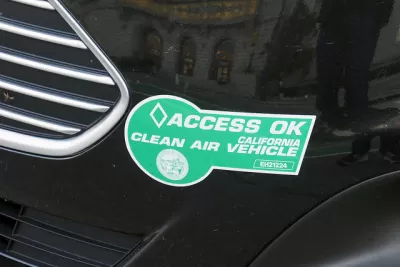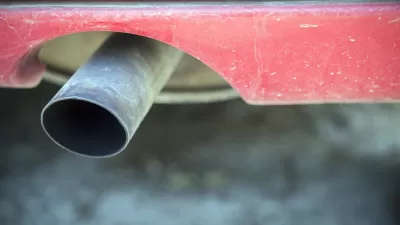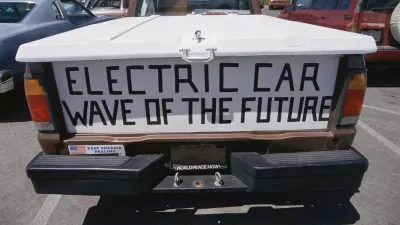No issue is more important to California's air and climate regulators than ensuring that the state retains its ability to set tailpipe emission standards. Mary Nichols, the head of the Air Resources Board, has threatened to ban tailpipes.

"Even if most people outside California have never heard of Mary Nichols, she’s the world’s most influential automotive regulator, says Levi Tillemann, author of The Great Race, a book on the future of automobile technology," wrote John Lippert for Bloomberg News (posted here) in August 2015.
Nichols continues her leadership of the California Air Resources Board (CARB) for at least the first phase of Gov. Gavin Newsom’s administration, no doubt to the chagrin of U.S. Environmental Protection Agency (EPA) Administrator Andrew R. Wheeler and U.S. Secretary of Transportation Elaine Chao, who head the two departments that determine greenhouse gas emissions and fuel economy standards for light-duty vehicles.
The Trump administration's Safer Affordable Fuel-Efficient Vehicles (SAFE) Rule, proposed last August, would freeze vehicle emissions standards at 2020 levels. In addition, the administration may withdraw the EPA waiver that allows California and like-minded states to set stricter standards than the federal government.
Nichols' threat to ban sales of light-duty vehicles powered by internal combustion engines by a future date was not made to the Trump administration nor the auto industry but during a joint workshop of the California Transportation Commission (CTC) and California Air Resources Board held May 16 in San Diego. Jennifer A Dlouhy reports for Bloomberg News:
“If we lose the state vehicle standards, we have to fill up the gap with other measures,” Nichols said at a forum on the issue Thursday.
“We will be faced with dramatic alternatives in terms of tighter, stricter controls on everything else, including movement of vehicles and potentially looking at things like fees and taxes and bans on certain types of vehicles and products.”
Dloughy notes that Nichols' prepared remarks were even more explicit:
“CARB will be exploring ways to ensure communities get the reductions of air pollution they so desperately need to keep the air clean and breathable -- and continue to fight climate change...
"That might mean, for example, tougher requirements for low-carbon fuels, looking at tighter health-protective regulations on California refineries, doubling down on our enforcement efforts on mobile and stationary sources -- and might lead to an outright ban on internal combustion engines.”
State legislation
Two bills to ban the sale of internal combustion engine vehicles by 2040 were introduced this year and last, both by Assemblymember Phil Ting (D-San Francisco). However, neither AB 40 nor AB 1745, respectively, were ever heard in committee.
Alternative to ban: market-based feebate
Environment reporter Rachel Becker wrote about the joint CTC/CARB workshop for CALmatters, a nonpartisan, nonprofit journalism venture, on May 24 (source article).
A ban on gas-powered cars isn’t imminent, Nichols said in an interview with CALmatters this week. “Ban — it’s not a word that we use, and we don’t like to use it,” she said. “But sometimes, we perhaps have to make a point. And the message here was intended to be heard by the auto industry.”
Becker describes the likely legal battle that would ensue should such a ban be enacted, but she also explores whether it would be a good idea.
“That would be a very blunt, last resort approach,” Daniel Sperling, director of the Institute of Transportation Studies at UC Davis and a member of the air board, said in an email.
Sperling said he thinks a better strategy would be a legislative one called “feebates,” which use fees to discourage dirty car use, and rebates to encourage people to drive cleaner vehicles. The Legislature has yet to agree.
Feebates tackle both parts of California's motor vehicle sales problem from an emissions perspective. Increased rebates would help spur more sales of zero-emission vehicles, and a fee on high-emitters would encourage consumers to consider alternatives to sport utility vehicles, the largest and still-growing segment of the state's auto market, as sales of more fuel-efficient cars recede.
At this point, feebates, last proposed in the legislature over a decade ago, and/or bans, are speculative. The only certainty is that CARB and EPA will be fighting each other over emissions standards in court.
-
White House Ends Talks with California Over Fuel Efficiency Standards, February 25, 2019
Hat tip to Weekly CALmatters.
FULL STORY: Why California’s air board won’t ban gas-powered cars yet

Alabama: Trump Terminates Settlements for Black Communities Harmed By Raw Sewage
Trump deemed the landmark civil rights agreement “illegal DEI and environmental justice policy.”

Planetizen Federal Action Tracker
A weekly monitor of how Trump’s orders and actions are impacting planners and planning in America.

The 120 Year Old Tiny Home Villages That Sheltered San Francisco’s Earthquake Refugees
More than a century ago, San Francisco mobilized to house thousands of residents displaced by the 1906 earthquake. Could their strategy offer a model for the present?

Opinion: California’s SB 79 Would Improve Housing Affordability and Transit Access
A proposed bill would legalize transit-oriented development statewide.

Record Temperatures Prompt Push for Environmental Justice Bills
Nevada legislators are proposing laws that would mandate heat mitigation measures to protect residents from the impacts of extreme heat.

Downtown Pittsburgh Set to Gain 1,300 New Housing Units
Pittsburgh’s office buildings, many of which date back to the early 20th century, are prime candidates for conversion to housing.
Urban Design for Planners 1: Software Tools
This six-course series explores essential urban design concepts using open source software and equips planners with the tools they need to participate fully in the urban design process.
Planning for Universal Design
Learn the tools for implementing Universal Design in planning regulations.
Clanton & Associates, Inc.
Jessamine County Fiscal Court
Institute for Housing and Urban Development Studies (IHS)
City of Grandview
Harvard GSD Executive Education
Toledo-Lucas County Plan Commissions
Salt Lake City
NYU Wagner Graduate School of Public Service




























